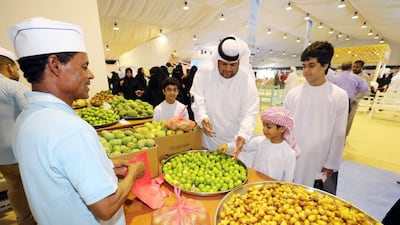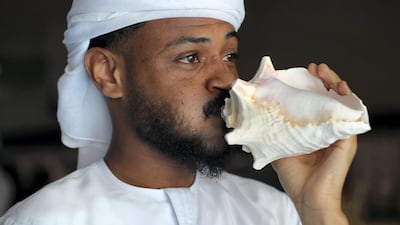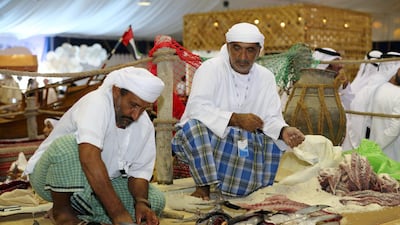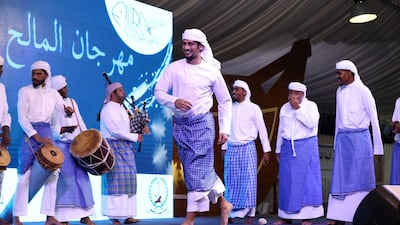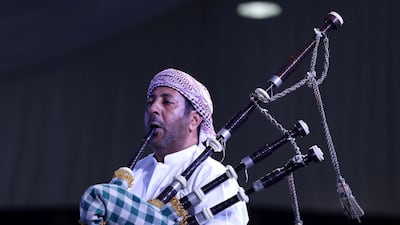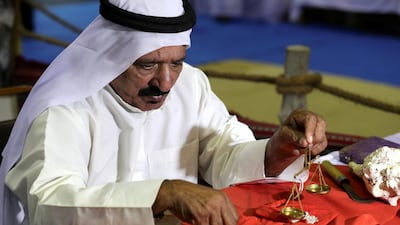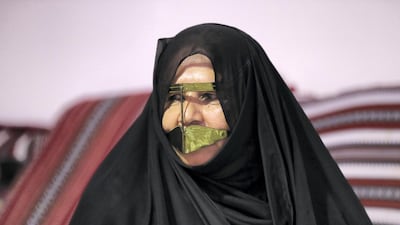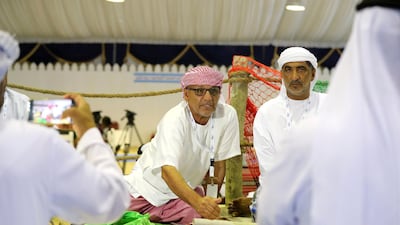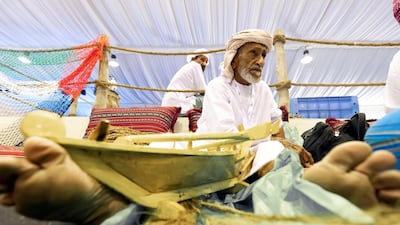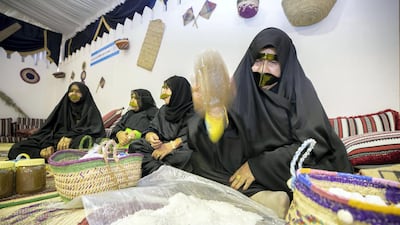When it comes to salting fish, Fatima Saeed is a seasoned veteran.
Now 65, she first took up the rich maritime tradition at the tender age of ten.
Ms Saeed is just old enough to have witnessed the end of the centuries-old industry.
When the fish came, the people followed.
“It was work and all work is hard,” said Ms Saeed. “But I felt at ease because any work is good.”
To salt a fish was to join the workforce. In the villages of the east coast, everyone’s work was connected to the fish salting industry. Whether they were a tobacco farmer or an ocean trader, a boat maker or a sail mender, the people of the coast and interior depended on salt fish for sustenance and trade.
Salt fish is an industry without the romance of the pearl or the falcon but it was an essential one.
That industry is being honoured this week at the seventh annual Dried Fish and Fishing Festival in Dibba Al Hisn, in Sharjah which runs until Saturday. Beneath a tent at the Dibba Marina, visitors can hear maritime shanties, get a bargain on barrels of pickled fish and hear firsthand tales of life in a time when salt fish brought wealth.
Entire villages descended from the mountains of Musandam and rowed down the eastern coast to settle in for the summer date harvest and fishing season.
Then came the traders by dhow from Iran, Basra and Kuwait and by donkey from the dark mountains of the interior.
The fish salting season in Ras al Khaimah drew caravans of 200 camels from the island of Abu Dhabi and the Buraimi oasis to exchange dates for salt fish.
Traders went from village to village by jelbut, quick and agile dhows, to collect dried fish for markets in Dubai and Muscat. From there, fish was exported to Bahrain, Lingah, India and even Sri Lanka.
Everyone participated, said Ms Saeed. “Men, women, we all worked. Young, old, we all worked. There was not one person who didn’t work.”
The practice of salted fish was born of necessity.
“Before there were no fridges, so we had to salt, right?” said Ms Saeed. “There was no electricity and so people came to buy. Now our fresh fish can travel to Dubai and Ras Al Khaimah easily. But before, all was salted.”
Ms Saeed has never stopped salting. She is known in Dibba Al Hosn for this, and for her mixed spices. Now that youth have traded life at sea for life in the city, she buys fresh fish.
"Put this on your rice," says Ms Saeed, unscrewing a jar of finely grated dried barriya, a sardine like fish.
The trick, if eating them whole, is not to eat the head. That is bitter.
Ms Saeed still remembers when these nutrient-rich fish flakes, drew merchants from across the Gulf.
“The boats came from Iran, from Basra, from Kuwait and they bought the fish,” she said. “They bought huge, huge amounts, maybe 500 or 1,000 pieces at a time and carried it to Iran, to Kuwait and to Basra. Then they would return immediately to buy more.”
In exchange, people traded honey, tobacco, firewood, charcoal from the mountains, paraffin, oil, diesel and salt from Iran, dates from Basra, and other necessities of daily life.
Fish was salted year round but festival organisers say it is in this season when the small fish, like barriyah and sardines would be hauled on shore and dry on the beach in tall mounds.
Sulaiman Abdullah Mohammed Al Dhuhoori remembers the days when his entire village would move from their mountain village of Sheesa, in Musandam, to coastal villages.
They descended from the cliffs and rowed together, for two days and one night. They rowed two to an oar. Brother and sister, husband and wife, rowing from early morning until the night. “We drank such salty water,” he said. “But my family never suffered from the sea.”
When the reached the coastal towns, it was a time to harvest fish from the sea and dates from the land.
The coastline has changed. Net fishing on shore still takes place on Oman’s eatern Al Batinah coast, usually with assistance from a few Landcruiser Pickups. But the coastline of the Emirates has changed and so, too, has the country’s fishing laws.
The festival has revived one of the most loved aspects of fish salting. Once again, people are gathered by the shore to share stories and exchange news, and maybe buy a few fresh mangoes and jars of barriyah for good measure.
